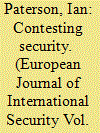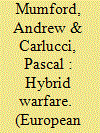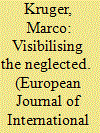|
|
|
Sort Order |
|
|
|
Items / Page
|
|
|
|
|
|
|
| Srl | Item |
| 1 |
ID:
190918


|
|
|
|
|
| Summary/Abstract |
Stratospheric Aerosol Injection (SAI), is often referred to as a ‘Plan B’ if mitigation strategies to reduce emissions fail and the need to rapidly reduce global temperatures becomes urgent. In theory, SAI would help buy more time to bring carbon and other emissions down while also cooling or keeping the planet below the threshold for dangerous warming, though it is not a solution to the problem of climate change in itself. What little attention it has received in International Relations (IR) is usually focused on the need for governance of the technology and assumes that development and use of the technology will be driven primarily by vulnerability to climate impacts. Through an analysis of common security assumptions and preemptive security framings the article shows that while current assessments of SAI focus on the technology’s environmental impact, broader political and security dynamics, particularly the desire to render climate change more intelligible as a security problem with a solution may have substantial influence on how the technology is used and by whom.
|
|
|
|
|
|
|
|
|
|
|
|
|
|
|
|
| 2 |
ID:
190913


|
|
|
|
|
| Summary/Abstract |
The security-migration nexus is ubiquitous throughout Europe and beyond. An avalanche of scholarship has explored the construction of migration as a security threat in general and, in the UK, the creation of the ‘hostile environment’ in particular – the problematic nature of each being well documented. Yet, far less attention has been paid to activities that contest this process. Deploying Balzacq's four modalities of contestation – desecuritisation, resistance, emancipation, and resilience – this article addresses the imbalance, exploring how asylum and refugee sector NGOs engage in and contest security-migration politics. Using Scotland (2018–19) as an illustrative case and analysing discursive and predominantly non-discursive activities, findings demonstrate that NGOs are successfully contesting the security-migration nexus in Scotland across four principal categories, supporting the ‘surviving’ and ‘thriving’ of asylum seeker and refugee communities, problematising previous conceptualisations of ‘UK’ asylum and refugee politics, with implications extending globally. The article helps refine the theorisation of contestation, demonstrating first, the need to move beyond studies of ‘desecuritisation’, with consequences for understandings of ‘success’ in securitisation, and second, the potential blindness of single-modality studies to vital, meaningful contestation, resulting in the production of less comprehensive visions of the security world.
|
|
|
|
|
|
|
|
|
|
|
|
|
|
|
|
| 3 |
ID:
190912


|
|
|
|
|
| Summary/Abstract |
Authoritarian regimes increasingly resort to surveillance and malware attacks to extend their coercive reach into the territory of other states and silence dissidents abroad. Recent scholarship has examined the methods of digital transnational repression and their detrimental effects on the fundamental rights and security of targeted individuals. However, the broader normative and security dimensions of these practices remain underexplored, especially with regard to the states hosting the affected exiles. Addressing this gap, our article investigates digital transnational repression as a potential violation of host state sovereignty. Mobilising emerging research on digital sovereignty and cybersecurity, we argue that digital repression can violate host state sovereignty in that it constitutes extraterritorial enforcement jurisdiction; interferes with open debate and national self-determination; impedes the host state's adherence to fundamental norms of international humanitarian law; and undermines host state authority, domestic sovereignty, and integrative capacities. We outline possible pathways to counter digital transnational repression, focusing notably on distributed cyber deterrence, punitive measures like sanctions, and norms and regulations restricting the global proliferation of offensive cyber capabilities. Building on a post-territorial notion of sovereignty that centres on the effects of state actions in and beyond cyberspace, our article contributes to reflections on a human-centric approach to cybersecurity.
|
|
|
|
|
|
|
|
|
|
|
|
|
|
|
|
| 4 |
ID:
190916


|
|
|
|
|
| Summary/Abstract |
A growing amount of literature is being devoted to interrogating gendered dynamics in both violent extremism and terrorism, contributing to the integration of international and feminist security. This includes how such dynamics can shape differences in the motivations and participation of women and men. By critically analysing ideological gender constructs in two women-only extremist forums – the Women's Forum on Stormfront.org and Women Dawah, a Turkish-language pro-Islamic State group chat on Telegram – and employing feminist methodology, this article demonstrates how gendered online spaces influence women's ‘everyday practices’ within extremist movements. We argue that women-only online spaces not only facilitate gendered practices by allowing women to share everyday experiences, hold ideological discussions, and engage in debate, but also provide an important means to navigate these issues within the movement itself. In fact, women-only forums are actively used by women within extremist movements to exert greater agency in the face of otherwise constraining gendered ideological constructs. In turn, gendered everyday practices are reinforced by virtual communities that strengthen a sense of meaning – and purpose – in the movement, albeit being ideologically confined to the private sphere in many ways. This study sheds light not only on the differences in participation between women and men, but also on how such virtual communities can serve as spaces to frame and reinforce gendered practices in extremist movements. This has key implications for deradicalisation and disengagement strategies, which are at present overwhelmingly gender neutral. We provide evidence of how women navigate agency in these spaces, while challenging the stereotype that women in extremist movements are typically passive actors confined to traditional roles.
|
|
|
|
|
|
|
|
|
|
|
|
|
|
|
|
| 5 |
ID:
190914


|
|
|
|
|
| Summary/Abstract |
This article presents the study of ambiguity as the essence of hybrid warfare to reconcile it with the international political context. It addresses the gaps in the literature in an effort to elucidate the essence of hybrid warfare not as a separate concept, but rather as the symptom of a changing political environment. The analysis of the literature is reinforced by two case studies: the war in eastern Ukraine of 2014 and the South China Sea dispute. Both these case studies express ambiguity in the combination of kinetic and non-kinetic means used to achieve political objectives. The article rests on three pillars that constitute the architecture of the central argument. The first pillar will address the gap in the current literature on hybrid warfare and how the current debate is too concerned with conflict dynamics rather than its political nature. The second pillar will delineate the essence, characteristics, and value of ambiguity in hybrid warfare. The third pillar will address the practice of hybrid warfare as the conduct of war by great powers.
|
|
|
|
|
|
|
|
|
|
|
|
|
|
|
|
| 6 |
ID:
190917


|
|
|
|
|
| Summary/Abstract |
The significant link between human rights violations and the eventual outbreak of atrocity crimes has been widely promoted across the UN system. However, the question of how the connection between the R2P norm and human rights plays out in the actual practices and debates of the UN Security Council has been relatively under explored. In response, the article builds on constructivist research into norm robustness in order to trace how the R2P's shift to an atrocity prevention focus has generated increased applicatory contestation over the push to expand the link between human rights and threats to international peace and security. Based on extensive analysis of UN Security Council meeting records and three case studies, the article highlights two competing ideological frames that currently divide the Security Council's approach to atrocity prevention. This division has emphasised a key disconnect between the work of the Security Council and other UN institutions such as the Human Rights Council, therefore severely limiting the potential for effective atrocity prevention responses. Thus, without a stronger connection to human rights in the process of threat identification, the R2P norm will remain considerably limited as a prevention tool. Consequently, the article also contributes to a new understanding of the critical role evolving institutional rules and practices play in state attempts to both constrain and reshape human protection norms.
|
|
|
|
|
|
|
|
|
|
|
|
|
|
|
|
| 7 |
ID:
190915


|
|
|
|
|
| Summary/Abstract |
The shift of responsibility from the state and public authorities to the individual and the local level is one of the most common critiques of resilience policies. Individuals are portrayed as self-responsible entrepreneurs of their own protection. This article proposes a more nuanced reading of this process by arguing that resilience also entails an emancipatory potential. Drawing on an analysis of the German disaster management system and its structural marginalisation of care-dependent people, the article discusses the potential of resilience to make so far neglected needs visible. This visibilisation is the precondition for the recognition and, subsequently, the societal negotiation of the various needs and resources. Recognition and material redistribution may then be the yardstick for assessing the legitimacy of a shift of responsibilities that rests on the appropriate consideration of power, privileges, and abilities of the respective referent object of responsibility. Taking up the Frankfurt School's tradition of immanent critique, security scholars should not restrict themselves to exercise the necessary critique of problematic resilience policies, but engage in carving out how resilience can contribute to freeing rather than burdening the (precarious) individual.
|
|
|
|
|
|
|
|
|
|
|
|
|
|
|
|
|
|
|
|
|